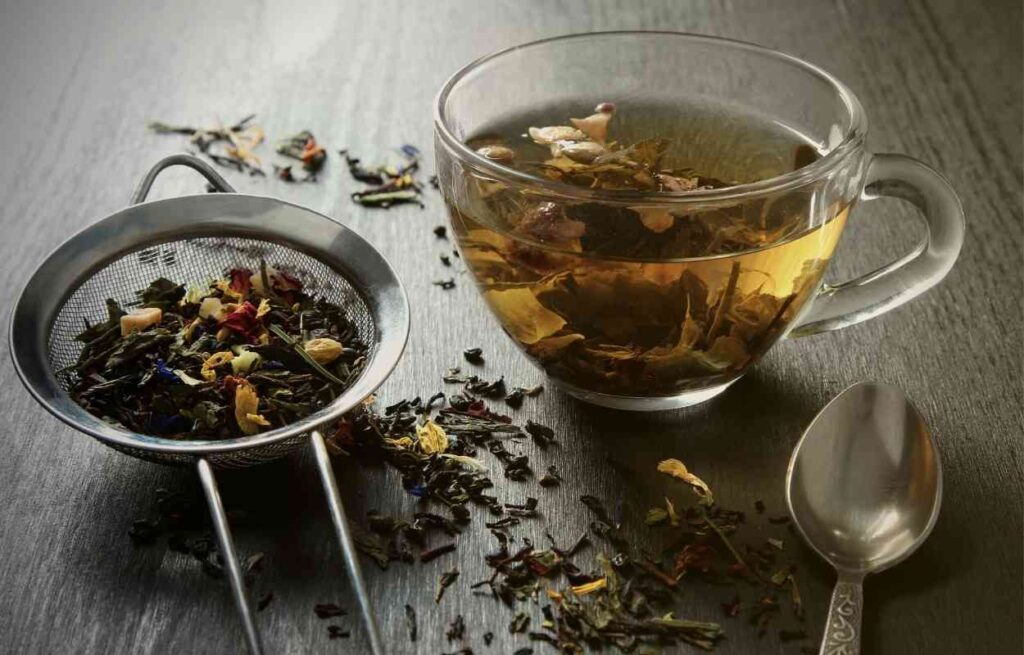Can You Freeze Herbal Tea?
As tea enthusiasts seek ways to prolong the shelf life of their favorite herbal blends, the question arises: Can You Freeze Herbal Tea?
Yes, herbal tea can be frozen. However, freezing may slightly alter its flavor and aroma due to the breakdown of volatile compounds and the expansion of water during the freezing process.
To preserve the quality, store herbal tea in an airtight container, thaw it slowly in the refrigerator, and consume it as soon as possible after thawing. Some herbal teas may be more sensitive to freezing than others, so caution is advised.

Why Freeze Herbal Tea?
Freezing herbal tea can serve several purposes. It helps prolong its shelf life, allowing tea enthusiasts to stock up on their favorite blends.
Freezing can also be beneficial for those who prefer to make large batches of tea in advance for convenience. However, it’s important to note that freezing may slightly alter the tea’s flavor and aroma.
Proper storage in airtight containers and careful thawing can help maintain the tea’s quality and ensure an enjoyable drinking experience.
Does Herbal Tea Freeze Well?
Herbal tea can be frozen, but it may undergo some changes in flavor and aroma. Freezing can break down volatile compounds and cause slight dilution due to water expansion.
However, with proper storage in airtight containers and slow thawing in the refrigerator, frozen herbal tea can still be enjoyed. It is advised to consume the tea as soon as possible after thawing to preserve its quality.
How to Freeze Herbal Tea?
Here is a step-by-step guide on how to freeze herbal tea:
- Brew the herbal tea: Prepare the tea using your preferred method, following the instructions for brewing. Allow the tea to steep for the recommended time to extract its flavors fully.
- Cool the tea: Once the tea is brewed, let it cool completely to room temperature. This step is crucial to prevent condensation and ice crystals from forming during the freezing process.
- Choose a container: Select a suitable container for freezing the tea. It should be airtight and freezer-safe to maintain the tea’s freshness and prevent any transfer of flavors.
- Pour the tea: Carefully pour the cooled herbal tea into the chosen container, leaving some headspace to accommodate expansion as it freezes. Avoid overfilling the container to prevent leaks or spills.
- Seal the container: Ensure the container is tightly sealed to prevent air exposure and freezer burn. Double-check the lid or cover to ensure a secure closure.
- Label and date: Use a marker to label the container with the type of herbal tea and the date of freezing. This step helps in identifying the tea later and tracking its storage duration.
- Freeze the tea: Place the container of herbal tea in the freezer, preferably on a flat surface to prevent spills. Avoid placing heavy items on top to maintain the integrity of the container.
- Thawing and consumption: When you’re ready to enjoy the frozen herbal tea, transfer it from the freezer to the refrigerator and allow it to thaw slowly. Once completely thawed, the tea can be consumed, either heated or served chilled, according to your preference.
How Do You Defrost Herbal Tea?
To defrost herbal tea, transfer the frozen container from the freezer to the refrigerator. Thawing slowly in the refrigerator helps maintain the tea’s flavor and aroma.
Depending on the quantity, it may take a few hours or overnight for the tea to completely thaw. Once thawed, the herbal tea is ready to be consumed, either heated or served chilled, according to personal preference.
Avoid using quick thawing methods like microwaving, as they can negatively impact the tea’s quality.
Can You Reheat Frozen Herbal Tea?
Reheating frozen herbal tea is possible, but it may affect the tea’s flavor and quality. To reheat, transfer the thawed tea to a heat-safe container and gently warm it on the stove or in a microwave.
However, reheating may further diminish the delicate flavors and aromas of the herbal tea. It is recommended to consume the thawed tea as is, either at room temperature or chilled, to preserve its original characteristics.
How to Tell If Herbal Tea Is Bad?
To determine if herbal tea has gone bad, there are a few signs to observe. Firstly, check for any visible mold, discoloration, or unusual growth in the tea leaves or bag.
Additionally, a rancid or off smell is an indicator of spoilage. Taste is another key factor; if the tea tastes sour, stale, or significantly different from its original flavor, it may have deteriorated.
It is crucial to trust your senses and exercise caution when consuming herbal tea that shows signs of spoilage, as it may lead to adverse health effects.
How Long Can You Freeze Herbal Tea?
Herbal tea can be frozen for a period of up to 3 months while still maintaining its quality. Beyond that timeframe, the tea may begin to deteriorate in flavor and aroma.
Proper storage in airtight containers and a consistent freezing temperature will help prolong its shelf life.
It is advisable to label the containers with the date of freezing and consume the tea within the recommended time frame for the best taste experience.
Wrap Up.
To sum up, herbal tea can be frozen, which gives tea lovers a way to make it last longer and make it easier to use.
Even though freezing can slightly change the taste and smell of tea, proper storage, and warming can help keep the tea’s quality. It’s important to remember that not all plant teas freeze well, and different people have different tastes.
If you follow the instructions and drink the thawed tea within a decent amount of time, frozen herbal tea can still be a pleasant and refreshing way to drink tea.
